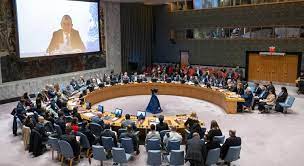Thirteen people are killed in Gaza by strikes, and Biden calls Israel’s military reaction “over the top.”
RAFAH: After Prime Minister Benjamin Netanyahu rejected Hamas’ offers for a cease-fire and promised to extend the attack into the southern Gaza town, Israeli airstrikes in Rafah, Gaza Strip, killed at least 13 civilians.

President Joe Biden referred to Israel’s military action in Gaza as “over the top” and said that he is still working “tirelessly” to get Hamas and Israel to agree to a protracted cease-fire.
In an interview with reporters on Thursday night, Biden said, “I am of the view, as you know, that the conduct of the response in the Gaza Strip has been over the top,” following his statements on a special counsel report about his handling of secret materials.
Rafah, the major entrance route for humanitarian supplies into the Gaza Strip, is a city on the largely restricted border with Egypt, where more than half of the population has left. Egypt has issued a warning, stating that any mass relocation over the border or ground operation there would be incompatible with its forty-year-old peace pact with Israel.
At least thirteen persons were killed in the strikes, two of whom were women and five of whom were children, according to the Kuwaiti Hospital that received the remains. At one of the striking locations, locals dug through the debris with pickaxes and their bare hands, using the torches on their cellphones.
“I hope we could gather their entire bodies rather than just fragments,” Mohammed Abu Habib, a neighbor who saw the impact, said.
Over 27,000 Palestinians have been murdered in Israel’s four-month-old air and ground onslaught, which is one of the most devastating in recent memory. The majority of the population has also been forced from their homes, and a quarter is on the verge of hunger.
According to Netanyahu, the onslaught will go on and intensify until Hamas achieves “total victory.” Hamas initiated the conflict on October 7 by conducting a massive incursion into southern Israel, during which terrorists murdered almost 1,200 people—mostly civilians—and kidnapped about 250 more.
After previous short pauses that had permitted the release of largely women and children, Biden has advocated for a lengthy break in the battle to assist the release of the remaining captives. Israel has promised to free the more than 100 prisoners who are still detained.
But as part of a hostage negotiation, Hamas has insisted that Israel free hundreds of Palestinian inmates and put a stop to the conflict. Benjamin Netanyahu, the prime minister of Israel, has declined to accept such conditions.
According to Biden, there is still hope for an agreement that might pave the way for the war’s conclusion.
Biden said, “I am pushing very hard right now to deal with this hostage cease-fire.” “I’ve been putting a lot of effort into this deal.”
As Hamas resurfaces in certain areas of northern Gaza, the original target of the onslaught and the scene of extensive damage, Israel’s objectives seem more and more unattainable. While Hamas claims more hostages have been murdered in airstrikes or in rescue attempts, Israel has only managed to free one captive.
Netanyahu said that plans were in place to extend the attack to Rafah, where hundreds of thousands of displaced persons from neighboring regions are jammed into filthy tent camps and overloaded shelters administered by the United Nations.
The Health Ministry in the zone controlled by Hamas reports that 27,840 Palestinians had died in the four months of fighting. The majority of the fatalities, according to the ministry, were women and children, although it does not separate its statistics between fighters and civilians.
The humanitarian crisis in Rafah would only become worse, according to warnings from international relief agencies, if there were any significant operations there.
Bob Kitchen of the International Rescue Committee said, “Palestinian children, women, and men will be at risk of dying by starvation or disease if they are not killed in the fighting.” “Palestinians won’t have a single’safe’ location to go to.”
Families were crying as they bid goodbye to their loved ones outside the hospital where the dead from the overnight strikes were transported. Warda Abu Warda expressed feeling powerless.
“Where should we go to find Rafah? She inquired, “Do we go to sea?”
To secure the release of the remaining captives, the US, Qatar, and Egypt are attempting to mediate a new cease-fire deal. However, the demands of Hamas include the cessation of hostilities, the complete departure of Israeli forces from Gaza, and the release of hundreds of Palestinian detainees, including prominent terrorists.
On Tuesday, Netanyahu called such demands “delusional” and said that Israel would never consent to an agreement that would give Hamas complete or partial sovereignty over the region it has governed since 2007.
On the other hand, talks would carry on, as stated by visiting Secretary of State Antony Blinken. This is the most recent indication of a widening gap between the two close friends on the future. For more talks, a Hamas team traveled to Cairo on Thursday.
Families of the captives and the general public are putting increasing pressure on Netanyahu to free them, even if doing so means making a deal with Hamas. It has been stated by at least one senior Israeli official that it may not be possible to destroy Hamas and save the detainees at the same time.
Although over 130 hostages are still being held by Hamas, over 30 of them are thought to be deceased, with the bulk having died on October 7. It is generally accepted that the gang is imprisoning the victims in subterranean tunnels and utilizing them as human shields for its senior commanders.







